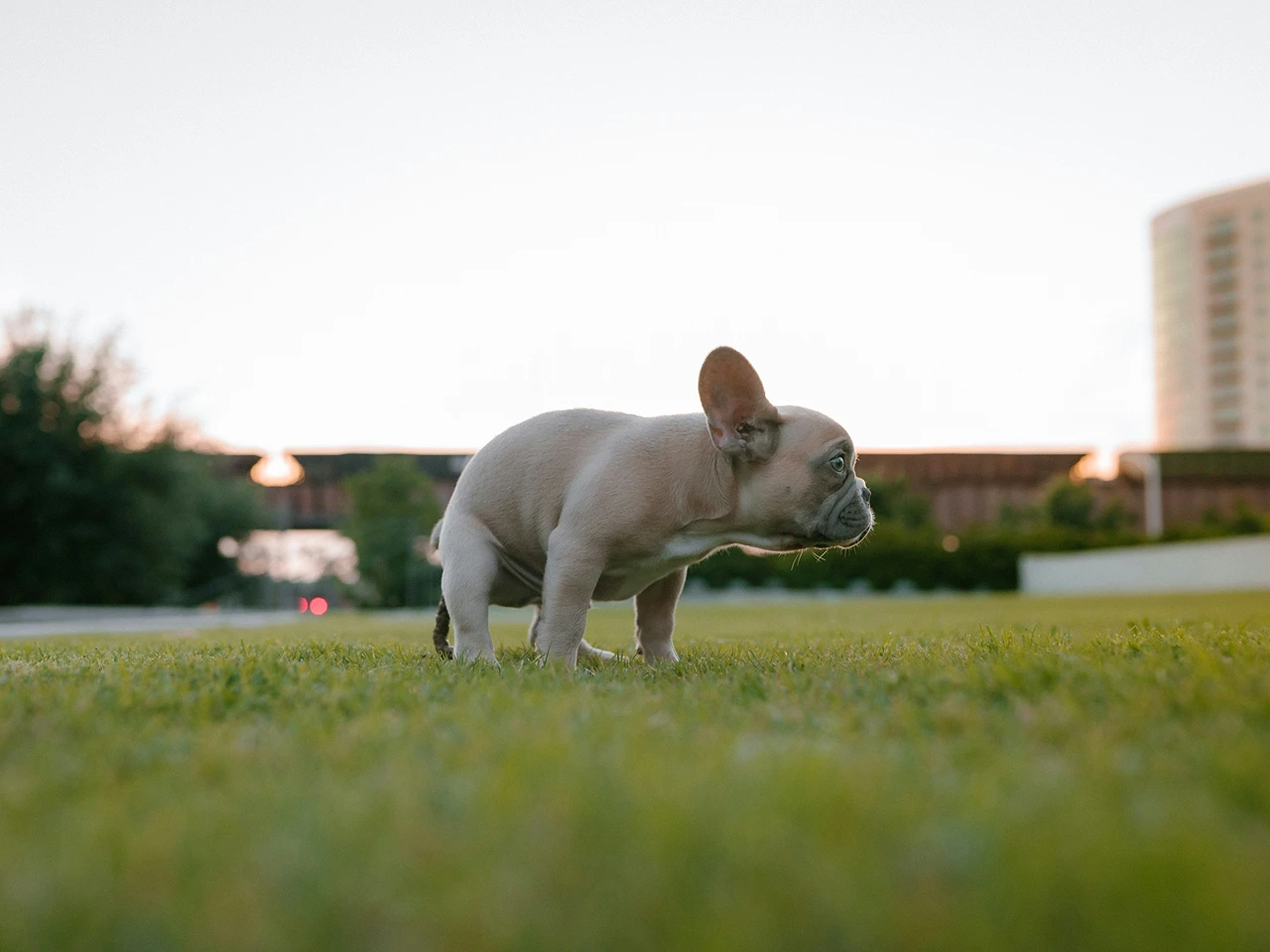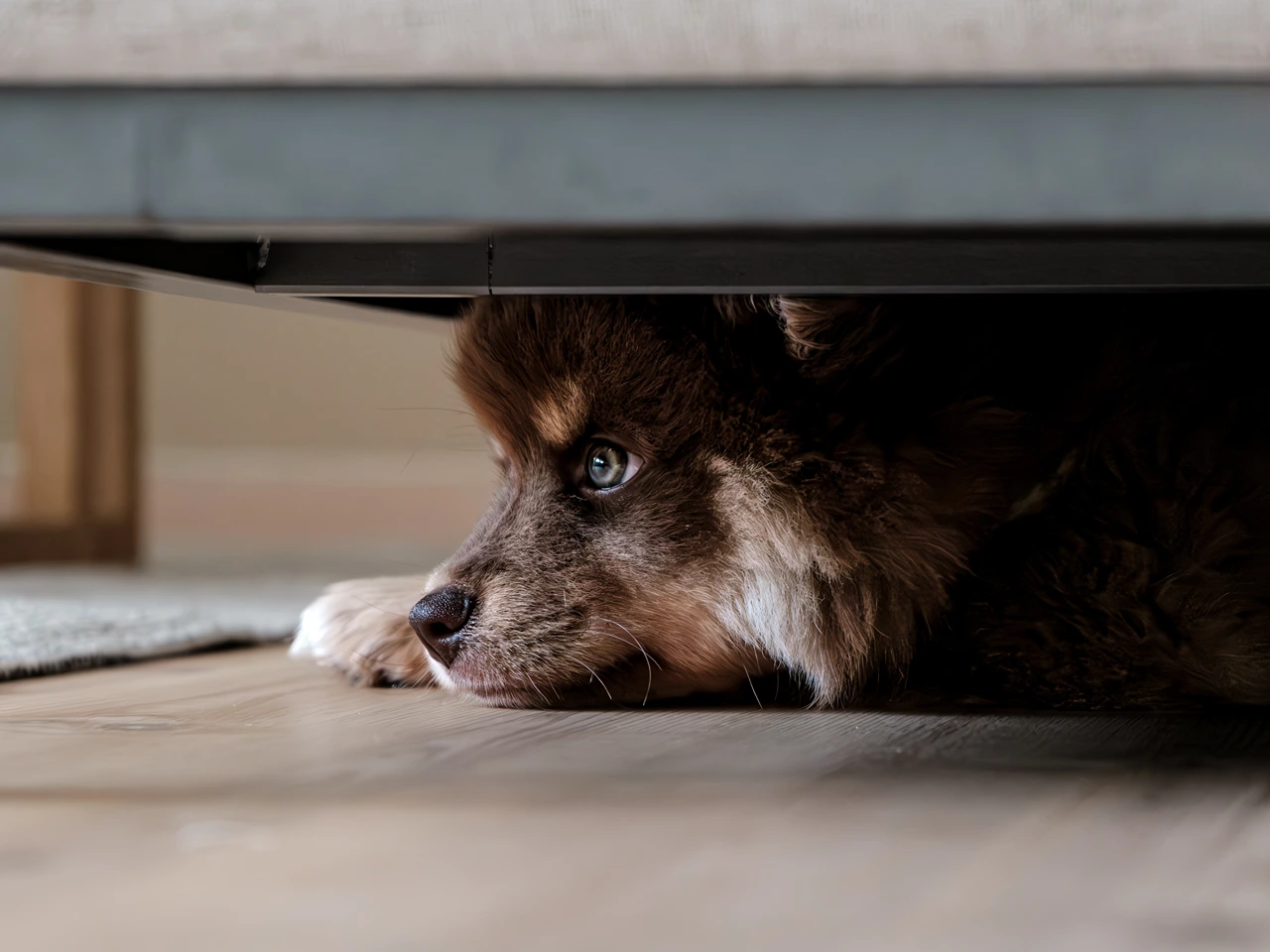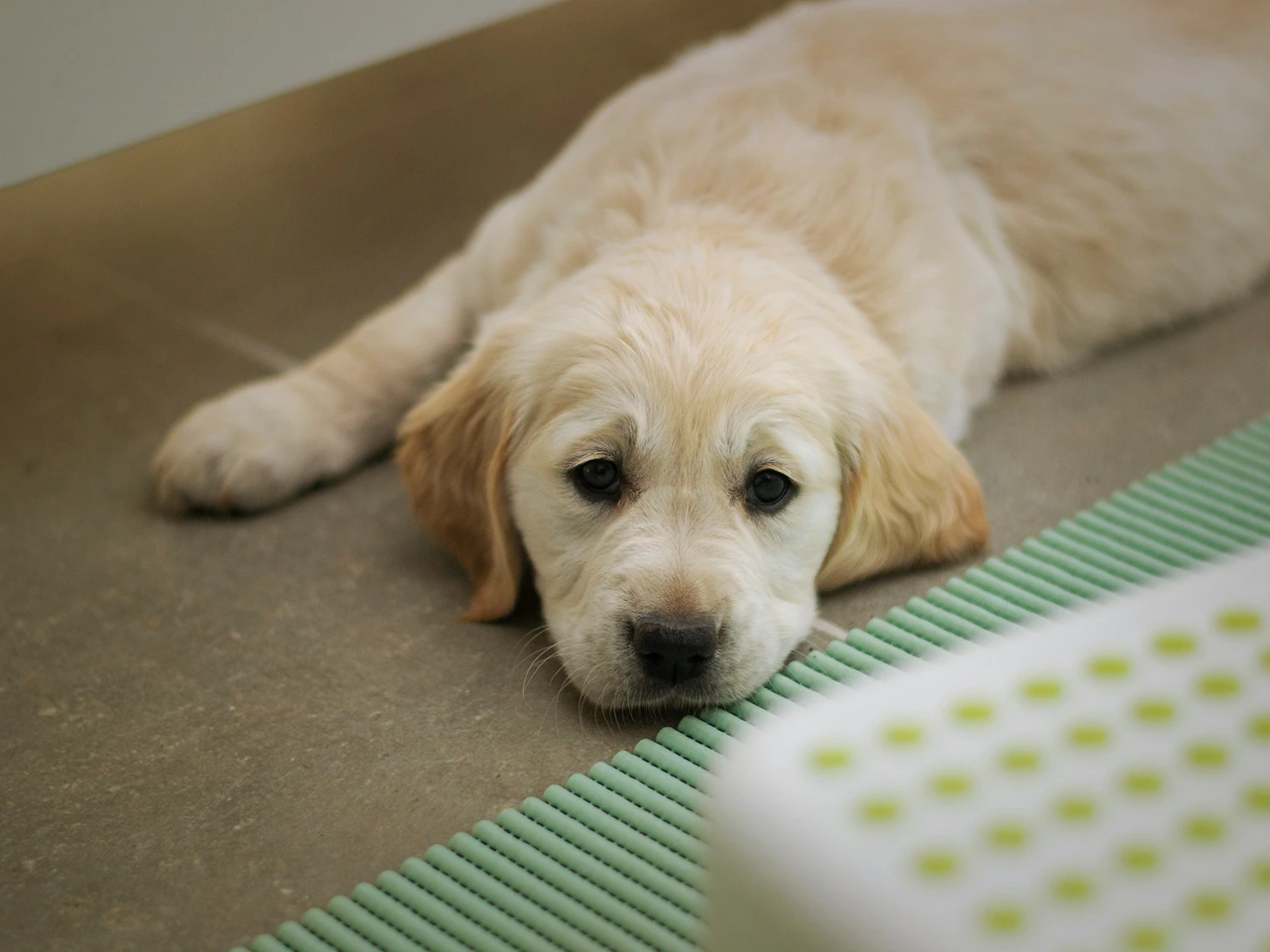TL;DR – Dog Diarrhea: When to Worry
Not all diarrhea is serious, but persistent or severe symptoms can indicate serious health issues.
- Watch for red flags like blood in stool, lethargy, dehydration, fever, or diarrhea lasting over 48 hours, these require vet attention.
- Colour matters: Yellow may signal rapid digestion or bile issues, green may be from grass or gut problems, and bloody stool (red or black) needs urgent vet care.
- Causes range from dietary indiscretion and stress to infections, allergies, and internal disorders.
- Before the vet, observe behaviour, try fasting (if advised), offer bland food, ensure hydration, and collect a stool sample.
- Vet care includes wellness exams, fecal testing, bloodwork, medications, and possibly fluids or long-term plans for chronic issues. Prevent diarrhea with a stable diet, probiotics, hydration, a clean environment, and regular vet checkups.
Not sure if it’s urgent? If your dog seems off and diarrhea is ongoing or paired with other symptoms, contact us. A quick call can make a difference in comfort and care.
Is your dog experiencing diarrhea, and you're not sure if it’s a cause for concern? Just like humans, dogs can have an upset stomach now and then, although it's common, you need to know when it’s just a one off and when it’s a sign of something more serious.
This guide will walk you through everything you need to know about dog diarrhea, from the causes and symptoms to what to do in the meantime, and signs that suggest it’s time to seek veterinary care.
Understanding Dog Diarrhea

Diarrhea is not a disease, it’s a sign that something else is going on inside your dog’s body. A healthy stool should be firm, log shaped and easy to clean up. If your dog has an episode of diarrhea that’s still somewhat formed and shows no other symptoms, it may not be a cause for alarm. But if the stool is watery, especially if it happens repeatedly, you should be more concerned.
Passing small amounts of watery diarrhea throughout the day could be intestinal inflammation, parasites or infections that need a vet’s insight.
Also, monitor how your dog is feeling overall. If your dog is unusually quiet, lethargic, not eating or hiding, these are warning signs that your dog is uncomfortable or unwell. While a dog may feel better quickly in many mild cases, continued symptoms need closer attention.
Stool Colour and What It Means
- Yellow diarrhea often points to food moving too quickly through the digestive tract, not giving the intestines enough time to absorb nutrients.
- Green stool may happen if your dog has eaten something like grass or non-food items; while not always dangerous, it may upset their stomach.
- Bloody diarrhea, especially if it looks dark or tarry, could be a sign of internal bleeding or more serious gastrointestinal issues and should be treated as an emergency.
The signs mentioned above are not a complete list of possible concerns. If you are experiencing diarrhea, regardless of its color or appearance, please contact us so we can help assess your situation and provide the right care.
Acute vs. Chronic
- Acute diarrhea comes on suddenly, typically lasting just a few days. It may be triggered by dietary changes, stress, or minor infections, and often resolves with basic care.
- Chronic diarrhea may persist for weeks and usually points to underlying health issues such as allergies, intestinal disease, or problems with nutrient absorption. Persistent symptoms like these require a proper diagnosis and treatment plan from a veterinarian.
How Dogs Get Digestive Issues: The Causes of Diarrhea in Dogs

Diarrhea can stem from various triggers. Identifying the cause of your dog’s diarrhea helps in choosing the right treatment. Here are the common causes of diarrhea in dogs:
Dietary Indiscretion
Dogs are naturally curious eaters, and sometimes that curiosity leads them to trouble. If your dog has eaten something spoiled, fatty, or non-edible, like trash or table scraps, it can cause diarrhea almost immediately.
Infections
Viral, bacterial, or parasitic infections are among the most serious causes of dog diarrhea. Conditions like Parvovirus, Salmonella, or Giardia can cause severe symptoms and often require urgent veterinary care.
Allergies and Sensitivities
Introducing a new brand of dog food can sometimes upset your dog’s digestive system, especially if it isn’t specially formulated for dogs with food sensitivities. Allergic reactions can lead to itching or loose stools.
Inflammatory Bowel Disease
Chronic inflammation of the gastrointestinal tract can lead to recurring bouts of diarrhea in dogs. This condition often needs long-term dietary changes and veterinary management to keep symptoms under control.
Stress and Anxiety
Emotional distress can take a toll on a dog’s digestive system. Whether it’s due to travelling, loud noises, or being left alone, diarrhea caused by stress is fairly common and may resolve once the dog feels secure again.
Internal Disorders
Underlying health problems like liver or pancreatic diseases can interfere with digestion. These conditions often present with other symptoms such as loss of appetite, lethargy, or vomiting, alongside diarrhea.
When To Worry About Dog Diarrhea

Not every messy accident is an emergency, but certain warning signs could be a sign that your dog needs to be seen by a vet. Watch closely for the following red flags:
- Blood in the Stool: If you notice bright red or tarry black, bloody diarrhea, it often points to internal bleeding, parasites, or a serious infection. This should never be ignored and warrants immediate attention.
- Dehydration: Your dog may not be drinking enough water or may be losing fluids through large amounts of watery stool. Dehydration can happen fast, especially in a puppy, who is more vulnerable to fluid loss.
- Diarrhea Lasting Over 48 Hours: If your dog has diarrhea over a short period and it doesn’t improve, or worse, starts to intensify, it’s time to consult your vet. Persistent diarrhea can quickly lead to complications.
- Weakness and Lethargy: A drop in energy alongside diarrhea can be alarming, particularly if your dog is very old or very young. This may indicate that the body is struggling to cope and needs medical support.
- Fever: If your dog shows signs of fever, such as shivering, panting, or hot ears, alongside diarrhea, don’t wait. These symptoms together mean it’s important to contact your vet right away.
What To Do Before Seeing the Vet

Before rushing to an animal hospital, there are a few steps you can take at home to keep your dog comfortable and gather useful information that can help your veterinarian provide faster, more accurate care.
- Observe Behaviour and Bathroom Patterns: Pay close attention to when your dog starts showing symptoms. Track how often your dog goes, what the stool looks like (consistency, colour, presence of blood), and any unusual behaviour. This allows you to give your vet as much detail as possible.
- Temporary Fasting: Sometimes, it's best to give your dog some time to recover by withholding food for 12–24 hours. However, this should be done only if advised by your vet, especially for puppies, senior dogs, or those with underlying conditions.
- Try a Bland Diet: Once fasting is complete, give your dog bland, easily digestible food in small amounts, boiled chicken (no seasoning) and plain white rice are great options. This gentle diet can help settle their stomach gradually.
- Hydrate with Care: Prevent dehydration by ensuring your dog always has access to clean, fresh water. You can also add electrolyte solutions (made for pets) to their water to support hydration, especially if the diarrhea is mild.
- Check for Changes: Think about any recent changes in dog food, treats, medications, or even activities like new environments or excessive play. Noting these can help uncover the cause of your dog’s diarrhea and narrow down possible triggers.
- Collect a Stool Sample: If you're able, bring a fresh sample of your dog’s stool to the vet. It can help your vet diagnose the problem faster by identifying infections, parasites, or other underlying issues.
How Veterinarians Diagnose and Treat Dog Diarrhea

If symptoms persist or worsen, it's time to take your dog in for an examination. The vet will let you know what's behind the upset stomach and recommend the most effective treatment based on the underlying cause of your dog’s diarrhea.
Full Examination
Your vet will begin by checking your dog’s vital signs, hydration levels, and physical condition. They’ll also ask about diet, behaviour changes, and medical history to gather important clues.
Fecal Testing
A stool sample helps identify the cause of your dog’s diarrhea. It allows the vet to test for parasites, bacterial infections, or abnormal microbial overgrowth that might be affecting the digestive system.
Bloodwork and Imaging
If symptoms like vomiting, lethargy, or fever are present, your vet may recommend blood tests or imaging (such as X-rays or ultrasounds). These can reveal issues with internal organs, inflammation, or more serious conditions.
Prescribed Medications
Treatment will vary based on the diagnosis. Your vet might prescribe anti-diarrheal medications, antibiotics, or probiotics to restore gut balance. Never give your dog human medications without consulting your vet, many are toxic to dogs and can worsen the problem.
Fluid Replacement
In cases of significant fluid loss, fluid therapy is essential to rehydrate your dog and stabilize vital functions. This is especially important if diarrhea is severe or prolonged.
Long-Term Care Plans
For chronic diarrhea, the vet may recommend special diets, ongoing medication, or additional testing to manage the condition long-term. Identifying and addressing food sensitivities or underlying health issues is key to preventing recurrence.
Home Care and Prevention Strategies

Preventing future cases of diarrhea helps keep your dog happy, healthy, and less stressed (and your floor cleaner!).
- Manage Your Dog’s Diet: Stick to specially formulated dog foods that meet your dog’s nutritional needs. Avoid sudden or frequent dietary changes, as they can cause diarrhea and disrupt your dog’s digestive balance.
- Maintain Hydration: Make sure your dog has access to clean, cool water at all times. Dehydration can worsen symptoms, so pay attention if your dog seems reluctant to drink, this may signal a deeper issue.
- Use Probiotics: Daily probiotic supplementation can improve your dog’s digestion and strengthen their gut flora. This is especially helpful in preventing unexplained diarrhea caused by stress, diet shifts, or minor imbalances.
- Clean Environment: Wash food and water bowls regularly and keep your home free from harmful temptations. Dogs are notorious for eating things they shouldn’t, and a dirty or cluttered environment increases the risk of ingestion-related issues.
- Regular Health Checkups: Many dog owners wait for a problem before heading to the vet, but preventive care is key. Routine wellness visits go a long way in treating the causes of diarrhea early, often before symptoms even appear.
Final Thoughts
If your dog's diarrhea is paired with vomiting, lethargy, fever, or it continues for more than a day or two, contact your vet. Never give your dog human medications unless instructed. When in doubt, it’s always a good idea to call your vet to see if things clear up or need further treatment.
Acting quickly helps prevent complications, especially in pets with underlying conditions. Diarrhea may not always be serious, but being cautious ensures your dog gets the care they need. Your attention and timely response can make a real difference in your dog’s health.
Frequently Asked Questions
What should I do if my dog has diarrhea?
Start with simple steps at home, but don’t ignore warning signs that need professional care.
Monitor the Severity First: Mild bouts of diarrhea may not be urgent, especially if your dog is acting normal otherwise. However, always keep an eye on symptoms as they can change quickly.
Check for Additional Symptoms: If your dog is dealing with diarrhea and is otherwise lethargic, vomiting, or not eating, these could signal more serious health concerns. A combination of symptoms, as well as diarrhea, warrants extra caution.
Fast and Feed Wisely: You may want to give your dog a break from food for 12–24 hours (unless advised otherwise), followed by a bland diet to soothe their stomach. Always consult a vet before fasting puppies or older dogs.
Ensure Proper Hydration: Keeping your dog hydrated is important, as diarrhea can also lead to fluid loss very quickly. Offer fresh water and consider pet-safe electrolyte solutions if symptoms are mild.
Call Your Vet If It Persists: Don’t wait too long. Contact a vet as soon as possible if the diarrhea lasts over 48 hours, worsens, or comes with other red flags. Early treatment prevents complications.
What are the causes of dog diarrhea?
There are several reasons behind dog diarrhea, some harmless, others requiring medical attention.
Dietary Indiscretions: Diarrhea cases often begin with dogs eating spoiled food, fatty scraps, or non-edible items. Keep an eye on their environment to prevent this.
Stress and Emotional Triggers: Stress from travel, loud noises, or changes in routine can lead to digestive upset. These cases of dog diarrhea usually resolve once the dog feels calm again.
Food Allergies and Intolerances: If your dog reacts to certain foods or ingredients, switching to hypoallergenic or limited-ingredient diets may help manage ongoing digestive issues.
Infections or Parasites: Some causes, like bacterial or parasitic infections, are more serious and contagious. Dogs showing other symptoms alongside diarrhea should be isolated and seen by a vet.
Chronic Conditions: Long-term conditions such as inflammatory bowel disease or pancreatic disorders can lead to dogs experiencing repeated episodes of diarrhea over time.
How can I tell if my dog's diarrhea is serious?
Some symptoms demand urgent care. Here’s how to spot the signs that it’s more than just an upset stomach.
Presence of Blood: Bright red or black, tarry blood in the stool can indicate internal bleeding. This is not a wait-and-see moment—seek help right away.
Duration of Symptoms: The urgency of diarrhea depends on how long it lasts. If symptoms persist beyond two days or escalate, that’s a sign to call your vet.
Overall Health Check: When diarrhea occurs with fever, vomiting, or significant lethargy, it may be more than just a stomach upset. These combined signs should not be ignored.
Age and Vulnerability: Every dog reacts differently, but puppies and senior dogs are especially at risk for complications from fluid loss and infection, even in mild diarrhea cases.
Energy and Appetite Levels: A dog that’s suddenly weak, not eating, or avoiding interaction, along with loose stool, should be evaluated promptly to avoid more severe outcomes.
How do vets diagnose and treat diarrhea in dogs?
Veterinarians use a mix of testing, observation, and treatment to get to the root cause and help your dog recover.
Comprehensive Evaluation: A vet will assess your dog’s hydration, vital signs, and recent behaviour to start piecing together possible causes of the upset.
Sample Testing: Stool samples provide critical insight, helping the vet identify parasites, bacteria, or foreign substances affecting your dog’s gut.
Advanced Diagnostics: In tougher cases, imaging or bloodwork may be used to rule out deeper issues like organ dysfunction or internal blockages.
Medication and Support: Treatment often includes medications prescribed by your vet, such as probiotics, antibiotics, or anti-inflammatory drugs to ease symptoms.
Tailored Recovery Plans: For chronic or recurring problems, vets may adjust your dog’s diet, recommend supplements, or propose long-term care to reduce future episodes.
How can I prevent diarrhea in my dog?
Simple habits and regular care go a long way in preventing messy and stressful diarrhea episodes.
Consistent Nutrition: Feeding a balanced diet designed for your dog’s breed and health reduces the chance of sudden digestive upsets, including cases of diarrhea.
Maintain a Clean Living Space: Regularly sanitize food and water bowls and remove tempting items from your dog’s reach. Cleanliness can greatly reduce the likelihood of diarrhea.
Use Probiotics Strategically: Daily supplements can help stabilize your dog’s gut health, especially in dogs prone to mild diarrhea during stress or dietary changes.
Stay Alert to Behavioural Shifts: Noticeable changes in energy, appetite, or mood may precede digestive issues. Watching your pet closely can help catch symptoms early.
Visit the Vet Regularly: Regular checkups are essential for early detection of problems, even if your dog seems healthy. Preventive care is the key to fewer and less severe diarrhea episodes.




